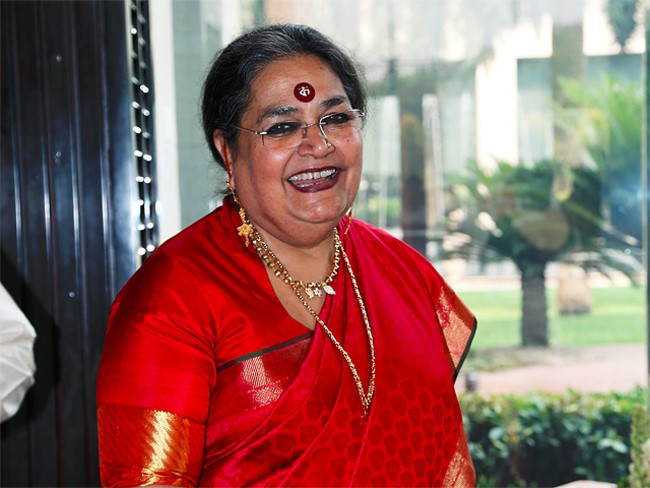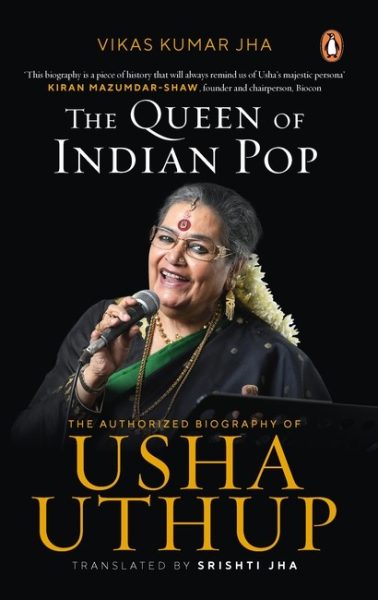
Not healthy to mix art & politics: Usha Uthup on a controversial episode in her life

It is not healthy to mix art and politics at all, observed the 74-year-old pop icon, Usha Uthup, at the recent release of her authorised biography in Kolkata last week.
The singer was harking back to a controversial period in her life when a Marxist minister had called for a ban of her concerts in state-owned institutions in Calcutta, after she had performed at a West Bengal government programme in the early 1980s. The former PWD minister, Jatin Chakraborty, had found her shows decadent and wanted to protect the state’s traditional culture from what he described as ”cheap, disco, perverted culture.”
Not willing to take this lying down, the feisty Uthup had filed a defamation suit against Chakraborty and won the case. Asserting that ”everyone has a right to sing and dance,” the Calcutta High Court too stood by her.
Uthup told a gathering at the Oxford Book store in Kolkata that looking back at that time, she recalled how the entire media had supported her, the then Chief Minister, the late Jyoti Basu had also stood by her and how the people of Bengal had backed her.
After nearly more than three decades, the singer, who has performed in Kolkata since 1969, and shot to fame with her Hindi film upbeat numbers such Hari Om Hari, Rambha Ho Ho, Jeete Hai Shaan Se etc., also thanked the Calcutta High Court for upholding the rights of an artist. Interestingly, Jyoti Basu who had attended that particular music and dance extravaganza held to raise funds for flood relief at Salt Lake Stadium, which Chakraborty had found so offensive, too had defended Uthup, saying her singing was ”all right with me.”
“It was a lovely picture, a wonderful picture in retrospect,” Uthup commented about that controversial episode in her life, which had even triggered a huge debate in culturally-aware Calcutta on sanskriti vs apasanskriti (culture vs decadent culture).

Also read: There was more to Bappi Da than disco and bling. Here’s why
Usha Uthup, who completed 50 years as a professional singer in 2020, has sung in several Indian and foreign languages including Bengali, Hindi, English, German, Italian and Sinhalese. Her autobiography, The Queen of Indian Pop: The Authorized Biography of Usha Uthup traces the life of this lively singer from her childhood days in Mumbai and her first gigs singing with jazz bands in Chennai’s glitzy nightclubs to her meteoric rise as India’s musical sensation.
The book reportedly explores Uthup’s “sense of freedom, her struggles, and her constructive and creative attitude towards work and life”.
In her interaction with a gathering at the book store, Uthup also opened up about how she became a complete Bengali of her “own will”, after she had married a Bengali in Calcutta. Though she was born in a Tamil family in Mumbai, Uthup said unlike many other Bengalis born to Bengali parents, she became a Bengali by her own will. She had met her future husband while singing at a restaurant ‘Trincas’ in the city.
She praised Calcutta for giving space and freedom to embrace everything in the city and in Bengal. “You turn out to be a Bengali here,” she said to the crowd at her book launch last week.
Also, Uthup shared how she had sent a letter expressing her admiration about the legendary singer Frank Sinatra, in which she had written, “This is Usha. I also sing. Hoping to meet you one day.” But lamenting the fact that there was no Instagram in those days, she confessed that Sinatra had never replied.
Uthup also spoke about singer-composer Bappi Lahiri who died last month, with whom she had given her most popular hits. According to her, people did not take Bappida seriously. She questioned as to why he was just labelled as ‘Disco King’ though he did so many beautiful melody songs such as Chalte Chalte.

